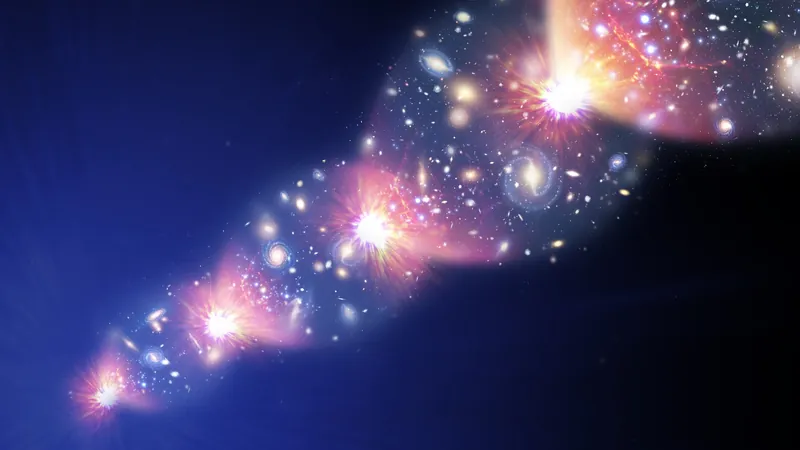
The Cosmic Countdown: When Will the Universe Meet Its End?
2025-05-24
Author: Mei
The Birth and Future of Our Universe
Since the dawn of time, scientists have been fascinated by the story of our universe's creation—a story that began with the monumental Big Bang 13.8 billion years ago. It involved an infinitesimally small, dense point exploding into the vast cosmos we know today. But what happens next? Speculating on the universe's fate has proven to be a complex puzzle.
Nemanja Kaloper, a physicist from UC Davis, emphasizes the challenge of confirming cosmological theories: "In physics, our ideas come alive through data, but cosmology often lacks the ability to recreate the universe for experimentation."
Two Compelling Theories of Cosmic Fate
So, how will the universe ultimately end? The debate typically centers around two leading theories: the Big Freeze and the Big Crunch.
The Big Freeze: An Endless Expansion?
Henry Tye, a professor emeritus of physics at Cornell University, argues that the most plausible future for our universe lies in the 'Big Freeze.' According to him, the universe is already on this path.
"The expansion of the universe will continue accelerating for 100 billion years, a trillion years, or perhaps indefinitely," Tye explains. This scenario implies that energy in the universe will be spread so thin over time that all cosmic processes—like stellar combustion and black hole formation—will eventually come to a halt, leading to what physicists call the 'heat death of the universe.'
The Big Crunch: A Cataclysmic Reversal?
On the flip side, there's the intriguing possibility of a 'Big Crunch.' Antonio Padilla, a physicist from the University of Nottingham, highlights that if the universe’s positive energy transitions to negative energy, it could reverse the expansion.
"In this scenario, the universe would expand only briefly before collapsing back in on itself, erasing existence as we know it," Padilla elaborates. What's eerie is that pockets of this reversal could already be happening but remain undetectable.
Recent predictions suggest timelines as soon as 100 billion years for a potential Big Crunch driven by dark energy—the mysterious force that's expanding the cosmos. However, Padilla's own research offers a glimmer of hope, estimating that we may have at least another trillion years before any significant change occurs.
Cycles of Creation: The Big Bounce?
Moreover, some scientists theorize that the universe might not end entirely but could partake in a 'Big Bounce.' In this cyclical model, the universe would go through phases of expansion, like the Big Bang, followed by contraction, setting the stage for another Big Bang.
The Uncertainty of Cosmic Predictions
Yet, predicting the universe's far-off future remains a Herculean challenge. Padilla notes, "Observations can only take us so far given the cosmic variables we're navigating." Furthermore, even if neither the Big Freeze nor Big Crunch proves accurate, some researchers suggest that all regular matter—stars, galaxies, and even black holes—could slowly evaporate, as predicted by renowned physicist Stephen Hawking. This evaporation could span an unfathomable 1 quinvigintillion years (that's 1 followed by 78 zeros!).
In Summary: The Clock is Ticking
While we are still in the dark about our universe's ultimate fate, the quest for answers continues to intrigue scientists and stargazers alike. Exploring these cosmic theories not only deepens our understanding of existence but also reminds us of our place in the grand tapestry of the cosmos.



 Brasil (PT)
Brasil (PT)
 Canada (EN)
Canada (EN)
 Chile (ES)
Chile (ES)
 Česko (CS)
Česko (CS)
 대한민국 (KO)
대한민국 (KO)
 España (ES)
España (ES)
 France (FR)
France (FR)
 Hong Kong (EN)
Hong Kong (EN)
 Italia (IT)
Italia (IT)
 日本 (JA)
日本 (JA)
 Magyarország (HU)
Magyarország (HU)
 Norge (NO)
Norge (NO)
 Polska (PL)
Polska (PL)
 Schweiz (DE)
Schweiz (DE)
 Singapore (EN)
Singapore (EN)
 Sverige (SV)
Sverige (SV)
 Suomi (FI)
Suomi (FI)
 Türkiye (TR)
Türkiye (TR)
 الإمارات العربية المتحدة (AR)
الإمارات العربية المتحدة (AR)